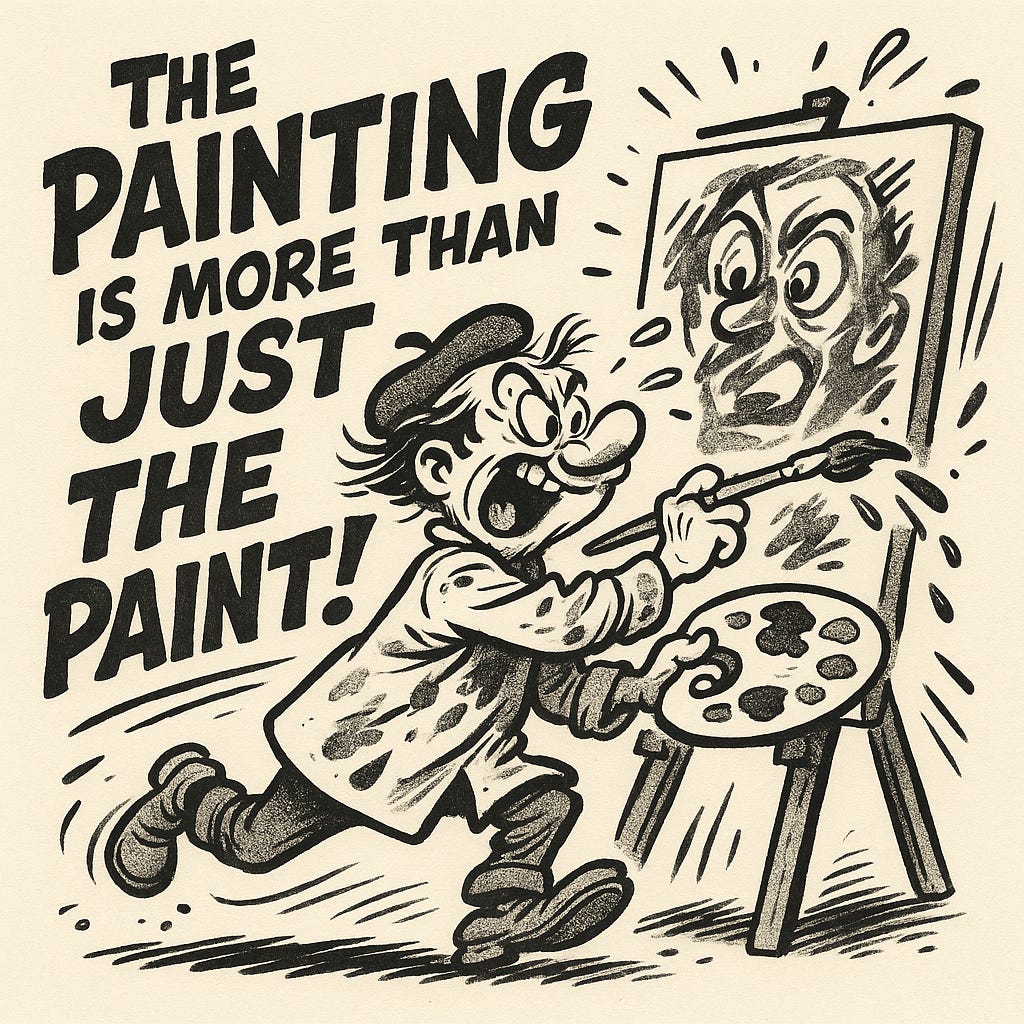The painting is not the paint
Don't confuse mechanism for value
No one would look at a famous painting and think “well, that’s only about $10 worth of paint, and maybe a few hours of the artist’s time at maybe $100 an hour (whatever), so it’s worth $500 (make up your own numbers).” Those things were certainly part of the painting being created, and they do have fixed value, but the real value of the painting is the idea, the impact, the art - however you want to describe it. We understand this - the mechanism isn’t valuable per se, it’s the outcome.
And yet…I see lots of folks in many realms that are being impacted by AI being caught up in the idea that the current mechanism is somehow inherently valuable and should be protected. Just to pick on my own industry for a minute, I see lots of programmers who are scared that the practice of writing code will be taken over by AI (true) and that they won’t have a job (false). ( I also see folks arguing the other side of this, amusingly - that even though AI will create code, because it’s currently not great code, that it never will be, and that “people reading code most of the time” will continue unchanged. I doubt it).
Code has always been a means to an end. If you want to be a bit more poetic, code is how we mediate between human intention and computer action. Programmers are the mediators, and code is the mechanism of that mediation - code plus some programmer judgment. But what really matters and is valuable is the computer action, the usefulness of whatever new thing we think of to have computers do. The code of a web page isn’t really that valuable, the fact of a connected internet of them is.
That mechanism of mediation (there’s a fun phrase - I seem to be in full nerd today) has always been evolving, as the capacity for software and hardware has changed. What we can do with computers has changed as processors have gotten faster and more connected, as devices have gotten more portable (and connected to sensors like cameras). Much of what we do now with our devices and software wasn’t possible at all when I started in my career 35 years ago.
This will be true for other fields as well. Often the practitioners of the field are highly trained in some specific mechanics - accounting, law, specific creative tools, etc. That skill is valuable, and often we charge for the time it takes to operate those mechanisms, because that’s convenient, but the mechanism itself isn’t we pay for. We don’t pay lawyers to produce words, per se, we pay them to produce results. We don’t pay a doctor to read a report, per se, we pay for their judgment and help getting to a medical outcome.
In my own career, many of the things that only a small number of people could do, like write code, have gotten easier. The market has expanded, and there is more value in the world. It’s meant that I have had to adapt and learn as the tools change, but that’s ok. It also means that the world is more inclusive - better tools mean that more people can get to the value than before. I can’t draw at all - it’s really nice to have tools that can help me express myself that way, for example.
We are richer and better, I think, the more that human creativity and intent can be expressed into actions. That intent will always be mediated into action, and those mediations will always change. It’s good to remember that the mechanism is not the outcome, the painting is more than just the paint.


But value to whom or what? If the mechanism tends to zero marginal cost, then the value of each unit of output will tend towards zero too, and rapidly once scarcity is no longer a constraint. In the US, some professions are like "guilds"; the value can be marginal (useless output), but the user must pay for a set mechanism price, and guild members are regulated to keep any competition very low.
Once, industries used cost-plus pricing. That changed to estimating pricing for perceived value, decoupling production costs from prices, although the price floor was the marginal cost of production. But as we become ever more post-industrial and service-oriented, who controls the price and the mechanism cost? Today, the aim seems to be to become the monopolist in a niche and to charge monopoly prices, create artificial scarcity, etc. How does that reduce welfare value to the buyers with no choice of purchase?
I look forward to there being a lot more code doing tasks, customized to the user. Code should have a marginal cost close to $0, so that there is no constraint on its supply. [Of course, that may mean that there is no constraint on malware, deepfake blackmail, etc., too. But hopefully there is a net positive benefit for society.]
Bottom line, I think your assertion that we should not confuse mechanism with value has been around forever, and understood by canny operators, and now has become the default of market-driven, vs production-driven, companies.